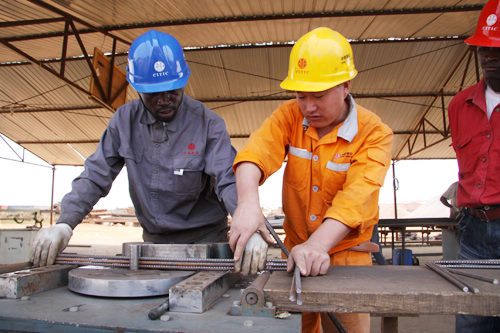|
 |
|
SIDE BY SIDE: A Chinese worker of CITIC Construction Co. Ltd. teaches a local colleague steel reinforcement techniques at an affordable housing project in Angola, Africa, in September 2011. The Chinese firm has received wide recognition in the African country due to a deep commitment to its corporate social responsibility (MU CHANGCHUN) |
Like many Chinese companies, China Minmetals is expanding its presence beyond the country's borders. In Australia, it has solidified its foothold. Many of its operations, such as Century Zinc Mine in Queensland and Golden Grove Copper Mine near Perth, are located in the communities of indigenous people.
While it pressed ahead with overseas forays, China Minmetals has played a significant role in promoting local social progress. It signed agreements with local governments and indigenous groups to provide education, training and employment opportunities for local residents, as well as cultural and environmental assurances.
As of December 2010, 21 percent of the workforce at Century Zinc Mine, and 2.5 percent at Golden Grove Copper Mine, were indigenous people. Hiring local workers helped the company better understand the local market and culture, and minimize the cost of sending Chinese workers to Australia.
China Minmetals is just one of the many Chinese companies trying to become a global corporate citizen.
"As they expand overseas, a growing number of Chinese firms are attempting to align their profits with lasting contributions to the local communities in which they operate," said a recent report jointly released by the World Economic Forum (WEF) and Boston Consulting Group (BCG). The report was based on a survey of around 100 Chinese enterprises and 130 senior executives.
The concept of corporate global citizenship advocates that companies engage with other stakeholders to improve the society in which they operate. Elements include ethical corporate governance, philanthropy and corporate social responsibility, as well as an emerging element: corporate social entrepreneurship, that is, the integration of socially responsible principles and ideas into products of commercial value, said the report.
"While they globalize, Chinese companies are able to exert a positive influence on global communities," said Robert Greenhill, Chief Business Officer and Managing Director of the WEF. "For Chinese businesses, building a better international reputation is also in their best interests," he said.
Christoph Nettesheim, Senior Partner and Managing Director of BCG Greater China, agreed. "As they strengthen product innovations and adjust their business model to better serve needs of local societies, the efforts would enhance the profitability of Chinese companies," he said.
"Honoring social responsibility means more than donations of money and other resources," said Lu Jinyong, Director of China Research Center for Foreign Direct Investment under the University of International Business and Economics. "More importantly, it is necessary to safeguard interests of local employees, obey local laws and regulations, and make greater contributions to environmental protection and economic prosperity."
China ranked fifth in the world in outbound direct investment (ODI) in 2010, which reached a record high of $68 billion, according to the World Investment Report of the United Nations Conference on Trade and Development.
The country's non-financial ODI stood at $60.07 billion in 2011, according to data from the Ministry of Commerce. By the end of 2011, Chinese companies had established more than 18,000 overseas firms in 178 countries and regions.
The expansion of Chinese companies has led to remarkable economic contributions to the foreign markets, in the form of jobs, and contributions to GDP and local taxes. According to the report, in 2010, Chinese firms employed nearly 1 million people in overseas markets, of which 71 percent were local residents, and most of them were mid-to-high-level managers.
Telecom equipment maker ZTE even partnered with local institutes in Indonesia to train local employees. Similarly, the Industrial and Commercial Bank of China also regularly sends local employees from developing countries to its headquarters in China for job-related training.
Meanwhile, policymakers have realized that shouldering social responsibility is a necessity for enterprises. The State-owned Assets Supervision and Administration Commission in 2008 released a set of guidelines for how centrally administered state-owned enterprises (SOEs) engage in corporate social responsibility (CSR) and report on these activities. The requirements included improved product quality and service level, resource conservation and environmental protection, indigenous innovation, CSR information disclosure and facilitating social welfare.
| 